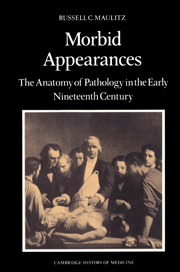Book contents
- Frontmatter
- Contents
- Dedication
- Preface
- Introduction: Ouverture: Bichat's head
- PART ONE PARIS
- PART TWO CHANNEL CROSSING
- PART THREE LONDON
- 7 After Waterloo: Medical journalism and the surgeon-apothecaries
- 8 Pathology and the specialist: The London Academy of Minute Anatomy
- 9 Propagation
- Conclusion: A language of morbid appearances
- Appendix: Transcription and translation of Figure 1.1
- Notes
- Selected bibliography
- Index
7 - After Waterloo: Medical journalism and the surgeon-apothecaries
Published online by Cambridge University Press: 22 September 2009
- Frontmatter
- Contents
- Dedication
- Preface
- Introduction: Ouverture: Bichat's head
- PART ONE PARIS
- PART TWO CHANNEL CROSSING
- PART THREE LONDON
- 7 After Waterloo: Medical journalism and the surgeon-apothecaries
- 8 Pathology and the specialist: The London Academy of Minute Anatomy
- 9 Propagation
- Conclusion: A language of morbid appearances
- Appendix: Transcription and translation of Figure 1.1
- Notes
- Selected bibliography
- Index
Summary
PATHOLOGY, MEDICAL JOURNALISM, AND THE FRENCH CONNECTION AFTER WATERLOO
Rampant xenophobia had preceded the end of hostilities between France and England. After the Congress of Vienna those sentiments could not be sustained at that early intensity. As malign feelings receded, the new political atmosphere provided a framework in which medical thought might be more freely channeled. The emergence of a new genre of medical periodical, the review journal, for example, had begun before the end of hostilities: the Medical Repository, for example, was introduced in 1814. But after 1815 there was a noticeable increase in both the number of competing journals, and a concomitant desire to monitor Continental developments more closely. Suddenly in demand were the services of Anglophile Europeans like the polymathic Italian Augustus B. Granville, based in Paris, as well as the services of Continent-based Englishmen like James Clark in Rome. In 1816 Granville, for example, began to send résumés of scientific activity in Paris to the Journal of the Royal Institution, and of all medical proceedings to the Medical Repository. So began the process by which English physicians' angle of vision began to be widened, and their images of medicine abroad strengthened and focused.
At first this process, dependent as it was on stringers like Granville, was a desultory one.
- Type
- Chapter
- Information
- Morbid AppearancesThe Anatomy of Pathology in the Early Nineteenth Century, pp. 161 - 174Publisher: Cambridge University PressPrint publication year: 1987



